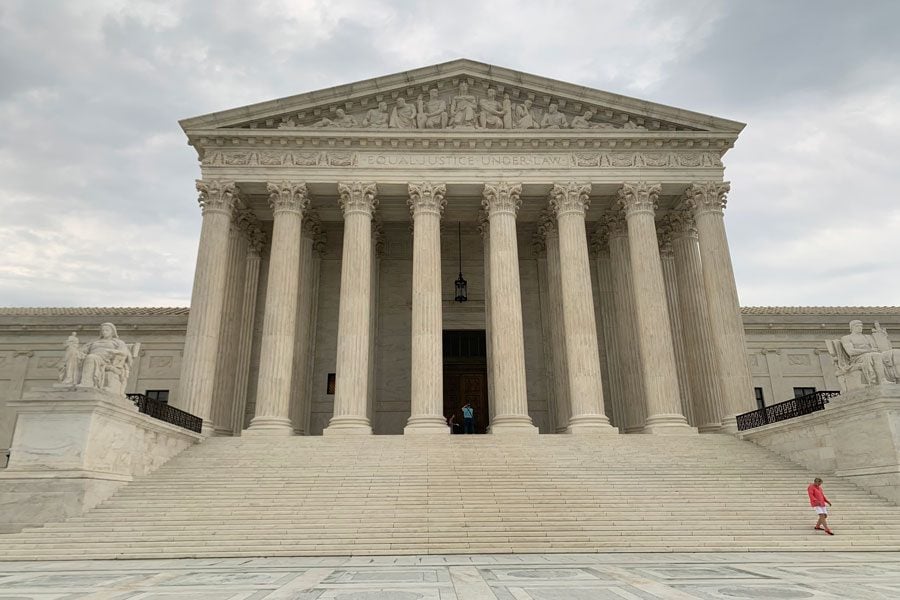Professors, students discuss divided Supreme Court on three historic LGBTQ employment discrimination cases
Daily file photo by Isabelle Sarraf
The Supreme Court building in Washington, D.C. The Court announced plans Friday to hear a case against Northwestern.
October 14, 2019
During its first week back in session, the Supreme Court heard arguments for the most important LGBTQ rights cases since the legalization of same-sex marriage in Obergefell v. Hodges four years ago.
Two cases, Bostock v. Clayton County and Altitude Express Inc. v. Zarda, involve sexual orientation discrimination, and the last case, R.G. & G.R. Harris Funeral Homes v. Equal Employment Opportunity Commission, focuses on gender identity discrimination.
The latter is the first transgender civil rights case brought to the Supreme Court.
For Northwestern students who are members of the LGBTQ community, the Court’s decisions on these cases could have a direct impact on their futures. NU Pritzker School of Law Profs. have broken down the key elements for and against LGBTQ employment discrimination protection. The question centers around Title VII of the 1964 Civil Rights Act, which prohibits discrimination against employees on the basis of race, color, religion, national origin, and, most important to these cases, sex.
Pritzker Prof. Andrew Koppelman said the argument for applying Title VII to protect LGBTQ employees is simple. He said sexual orientation and gender identity are attached to the word “sex” in Title VII, which disputes the plain text of the statute.
“An employer that fires women who date women but not men who date women discriminates on the basis of sex,” Koppelman said. “Treating a woman worse because she’s a woman is sex discrimination.”
The Supreme Court’s politicization has escalated during the Trump administration with two new conservative justices, Neil Gorsuch and Brett Kavanaugh, but Gorsuch’s position as the swing vote in these three arguments could make all the difference, Koppelman said.
Koppelman said Gorsuch believes in textualism, which holds that laws should only be interpreted based on their plain language.
“The judges are pulled in two directions,” Koppelman said. “The problem is that the plain language of the law points to a result that (the conservative justices) are not politically inclined to like.”
Pritzker Prof. Susan Provenzano also said that the primary battle of the Court is over the meaning of the word “sex” in Title VII, because Congress in 1964 failed to consider the possibility of the statute covering sexual orientation or gender identity.
“The question is whether we can now read ‘sex’ in a more contemporary way because social and cultural norms have changed,” Provenzano said. “We should be mindful of that in thinking of the word ‘sex’ today, or are we constrained to what ‘sex’ was supposed to cover in 1964?”
Only 21 states have enacted statues that ban LGBTQ employment discrimination, which means that 48 percent of LGBTQ Americans live in states where they could be fired based on their sexual orientation or gender identity.
This May, the House of Representatives passed the Equality Act, which would provide explicitly anti-discrimination protections for LGBTQ Americans, including employment. The bipartisan bill received the most congressional support of any pro-LGBTQ legislation in history.
Until the House bill is taken up by the Republican-controlled Senate, Provenzano said the cases brought before the Court last week are the only immediate window of opportunity for federal protection of LGBTQ employees. The decision by the Court, set to be released by early summer 2020, will hinge on the justices’ method of interpretation of the word “sex” in Title VII.
Communication junior and Rainbow Alliance External President Lily said while Northwestern and the state of Illinois protect LGBTQ employees from workplace discrimination, the lack of protection throughout the country poses a direct threat to her and her fellow LGBTQ-identifying peers.
Lily said that she questions even stating her title as president of Rainbow Alliance on her resúme because it means she could face explicit discrimination. She described the sadness she feels when she has this thought each time she has applied for an internship.
“I come from Ohio and I know that there aren’t any discrimination laws that protect (private employees) based on their sexual orientation or gender identity,” Lily said. “I have a lot of friends who don’t advertise that they’re gay, knowing in the back of their minds that they could be denied a job.”
Email: isabellesarraf2022@u.northwestern.edu
Twitter: @IsabelleSarraf
Related Stories:
– Thuillier: Anti-LGBTQ+ discrimination in the workplace is an issue that needs to be addressed
– Thuillier: It’s time for a conversation about the system of Supreme Court appointments



